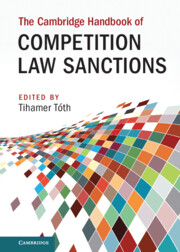Book contents
- The Cambridge Handbook of Competition Law Sanctions
- The Cambridge Handbook of Competition Law Sanctions
- Copyright page
- Contents
- Authors’ Affiliations
- Acknowledgment
- Part I General Chapters
- Part II Country Reports
- 17 Competition Law Sanctions in Austria
- 18 Antitrust Enforcement in Belgium
- 19 The Effectiveness of Competition Law Sanctions: Brazil
- 20 The Present Situation and Improvement Direction of the Sanction System in China’s Anti-monopoly Law
- 21 Application of the 2006 Guidelines on Fines by the European Commission and the Union Courts
- 22 Competition Law Sanctions in Germany
- 23 Competition Law Sanctions in Hungary
- 24 Competition Law Sanctions in Indonesia and a Comparison to Other ASEAN Member States
- 25 Competition Law Sanctions in Italy
- 26 Competition Law Sanctions in Japan
- 27 Effectiveness of Competition Law Sanctions: Kenya
- 28 The Enforcement of Competition Law in the Netherlands
- 29 A Barking Dog Seldom Bites
- 30 Effectiveness of Competition Law Sanctions
- 31 Competition Law Sanctions in Spain
- 32 The Swedish Competition Law Enforcement System
- 33 Effectiveness of Competition Law Sanctions: Turkey
- 34 Competition Law Sanctions in the United Kingdom
27 - Effectiveness of Competition Law Sanctions: Kenya
from Part II - Country Reports
Published online by Cambridge University Press: 29 July 2022
- The Cambridge Handbook of Competition Law Sanctions
- The Cambridge Handbook of Competition Law Sanctions
- Copyright page
- Contents
- Authors’ Affiliations
- Acknowledgment
- Part I General Chapters
- Part II Country Reports
- 17 Competition Law Sanctions in Austria
- 18 Antitrust Enforcement in Belgium
- 19 The Effectiveness of Competition Law Sanctions: Brazil
- 20 The Present Situation and Improvement Direction of the Sanction System in China’s Anti-monopoly Law
- 21 Application of the 2006 Guidelines on Fines by the European Commission and the Union Courts
- 22 Competition Law Sanctions in Germany
- 23 Competition Law Sanctions in Hungary
- 24 Competition Law Sanctions in Indonesia and a Comparison to Other ASEAN Member States
- 25 Competition Law Sanctions in Italy
- 26 Competition Law Sanctions in Japan
- 27 Effectiveness of Competition Law Sanctions: Kenya
- 28 The Enforcement of Competition Law in the Netherlands
- 29 A Barking Dog Seldom Bites
- 30 Effectiveness of Competition Law Sanctions
- 31 Competition Law Sanctions in Spain
- 32 The Swedish Competition Law Enforcement System
- 33 Effectiveness of Competition Law Sanctions: Turkey
- 34 Competition Law Sanctions in the United Kingdom
Summary
This chapter examines the competition sanctions regime in Kenya. Competition sanctions and enforcement tools adopted by the Competition Authority of Kenya (CAK) have evolved, in what has been a historical shift. During its earlier years of operation, CAK required undertakings found to have engaged in restrictive trade practices to undertake advocacy initiatives, or cease and desist from future conduct. However, in the recent past CAK has continually imposed punitive administrative fines, increasing them steadily. In most cases, undertakings have preferred to enter into a settlement agreement with CAK. At the time of writing , no cartel case had been prosecuted in Kenya and no administrative fines had been imposed on an individual. To enhance detection of cartel conduct, CAK has adopted novel enforcement tools such as the informant reward scheme and the leniency program whose effectiveness is yet to be evaluated. The biggest challenge facing the Kenyan competition sanctioning regime is a low level of competition culture and a lack of public awareness, making CAK over-reliant on its own investigations and market inquiries in detecting cartel conduct. By taking stock of the Kenyan competition regime, this chapter provides understanding of the appropriate sanctions and remedies adopted by young and emerging competition agencies in developing countries.
- Type
- Chapter
- Information
- The Cambridge Handbook of Competition Law Sanctions , pp. 520 - 545Publisher: Cambridge University PressPrint publication year: 2022
- 1
- Cited by

